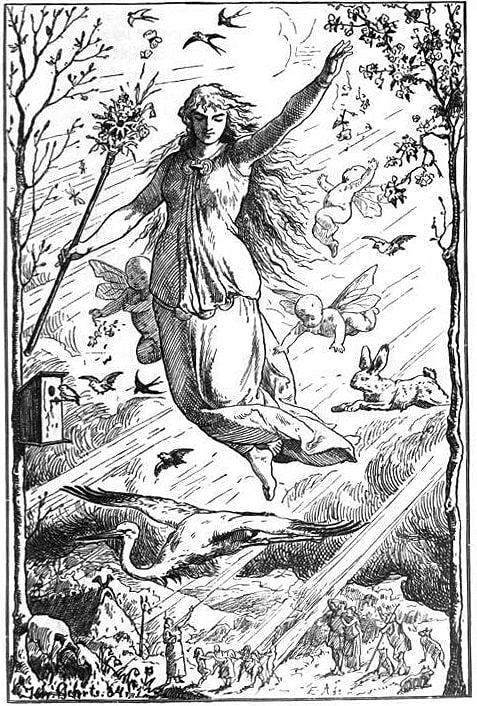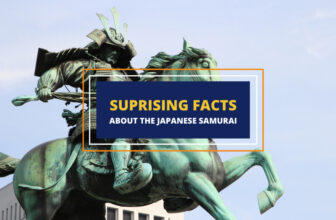
Easter, Pascha, or just “The Great Day” as the holiday is called in many cultures, is one of the two biggest holidays in most Christian denominations, alongside Christmas. Easter celebrates the resurrection of Jesus Christ on the third day of his crucifixion.
Even though all that sounds pretty clear-cut, the exact date and history of Easter are quite convoluted. Theologians have been quarreling about the proper date of Easter for centuries and there still doesn’t seem to be any consensus.
Add the question of Easter’s roots in European paganism and it’s no surprise that entire libraries can be and have been filled with questions about the origins of Easter.
Easter and Paganism

Most historians seem to agree that the reason this holiday is widely known as “Easter” is due to its origins in paganism. The main connection cited here is that with the Anglo-Saxon goddess of spring and fertility Eostre (also called Ostara). The Venerable Bede posed this hypothesis back in the 8th century AD.
According to this theory, Eostre’s festival was appropriated into Christianity, much like how the early Christians did with the Winter Solstice festival, which became known as Christmas. The fact that Christianity was known for doing this is not a controversial statement to make – early Christians spread their faith so widely and quickly precisely by accommodating other faiths into the Christian mythos.
For example, it was common to equate the gods and demi-gods of different pagan faiths to the various angels and archangels of Christianity. This way, the newly-converted pagans could keep their holidays and most of their cultural practices and beliefs whilst converting to Christianity and accepting the Christian God. The practice isn’t unique to Christianity as many other religions that grew large enough to be spread across multiple cultures did the same – Islam, Buddhism, Zoroastrianism, and more.
However, it is controversial whether this applied to Easter. Some scholars argue that the roots of Easter’s name actually come from the Latin phrase in albis – a plural form of alba or dawn. That word later became eostarum in Old High German, and from there became Easter in most modern Latin languages.
Regardless of the exact origins of Easter’s name, the connection with paganism is clear as that’s where many of Easter’s traditions and symbols come from, including the colored eggs and the Easter bunny.
Other Names of Easter

It should also be mentioned that Easter is only called this in some parts of the Western world. In many other cultures and Christian denominations, however, it has other names.
The two you’re most likely to encounter are versions of Pascha or Great Day in many the Eastern Orthodox cultures (spelled Велик Ден in Bulgarian, Великдень in Ukrainian, and Велигден in Macedonian, to name a few).
Another common term for Easter in many Orthodox cultures is simply Ressurection (Васкрс in Serbian and Uskrs in Bosnian and Croatian).
The ideas behind names such as Ressurection and Great Day are fairly obvious, but what about Pascha?
In both ancient Greek and Latin, Pascha comes from the old Hebrew word פֶּסַח (Pesach), or Passover. That’s why languages and cultures all over the world share this name for Easter, from the French Pâques to the Russian Пасха.
However, this brings us to the question:
Why Passover? Isn’t that a different holiday from Easter? That question is exactly why to this day different Christian denominations still celebrate Easter on different dates.
Easter’s Disputed Date

The debate around Easter’s “correct” date is mostly fought between Western and Eastern Christian denominations. It was initially known as the Paschal controversy or the Easter controversy. These were the main distinctions:
- Early Eastern Christians, especially in Asia Minor, observed the day of Jesus’ crucifixion on the same day Jewish people observed Passover – the 14th day of the first moon of spring or 14 Nissan in the Hebrew calendar. This meant that the day of Jesus’ resurrection should be two days later, on 16 Nissan – regardless of which day of the week it was.
- In Western Christianity, however, Easter was always celebrated on the first day of the week – Sunday. So, there, Easter was celebrated on the first Sunday after the 14th day of the month Nissan.
Over time, more and more churches pushed for the second method as it was convenient for the holiday to always be on a Sunday. So, as of 325 AD, the Council of Nicaea decreed that Easter should always be on the first Sunday after the first full moon after the Spring Equinox of March 21. That’s why Easter always has a different date but is always somewhere between March 22 and April 25.
Why are there still different dates for Easter, then?
The difference in the date between Eastern and Western Christian denominations today doesn’t actually have anything to do with the Paschal controversy anymore. Now, it’s due to the East and the West using different calendars. While Western Christians, as well as most people around the world, use the Gregorian calendar, Eastern Orthodox Christians still use the Julian calendar for religious holidays.
That’s despite the fact that people living in Eastern Orthodox Christian countries are also using the Gregorian calendar for all secular purposes – the Eastern Orthodox church simply continues to refuse to re-adjust its holidays. So, as the dates in the Julian calendar lag 13 days after those in the Gregorian calendar, the Eastern Orthodox Easter always takes place after that of the Western Catholic and Protestant churches.
A slight additional difference is that the Eastern Orthodox church prohibits Easter to be celebrated on the same day as Passover. In Western Christianity, however, Easter and Passover often overlap as was the case in 2022. On that point, the Western tradition does seem contradictory as Jesus’ resurrection is supposed to have occurred two days after Passover – it’s his crucifixion that transpired on Passover, according to Mark and John in the New Testament.
Various attempts have been made in the 20th and early 21st centuries to arrive at an Easter date that all Christians can agree but to no avail so far.
Conclusion
Easter continues to be one of the most widely celebrated Christian holidays, but its origins, date, and even name continue to be debated.








